11 Reasons to Garden with Kids
Fresh air, exercise, good food… You take the kids into the garden thinking it must be good for them.
And you’re right!
The benefits of kids spending time in nature are plentiful.
But, it’s not always easy to garden with kids. You get small boots stomping on plants or small hands pulling prized veggies (instead of weeds) or whining. Sometimes, it’s faster to just do things yourself.
The next time you’re feeling frustrated, take heart. Here are 11 reasons why getting kids outside and into the garden is worth a few smashed plants and dirty clothes.
1. Clean Food (that they’re more likely to eat)
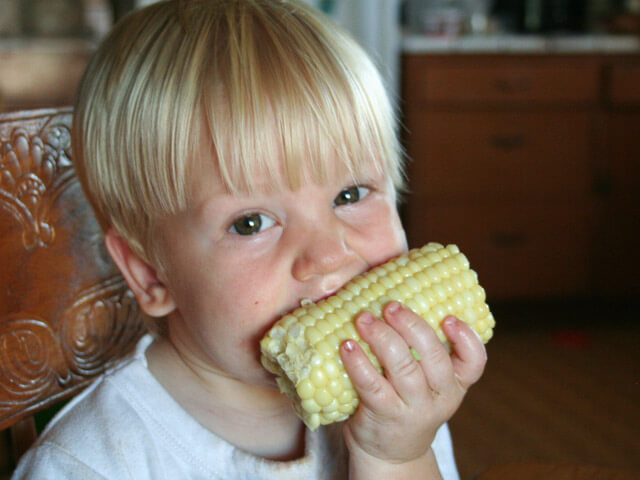
It is so powerful to know the source of your food. You don’t have to wonder about what chemicals were sprayed on it. No need to ponder how long it sat in a truck traveling across the country (leaking nutrients along the way). When you grow your own food, even if you’re only growing part of what your family needs, you tend to eat closer to home and more seasonally.
Plus, your kids may eat more of it! A study by Debra Haire-Joshu, Ph.D., at St. Louis University showed that children eat more fruits and vegetables when the produce is homegrown. “When children are involved with growing and cooking food, it improves their diet,” Haire-Joshu said.
2. Connections
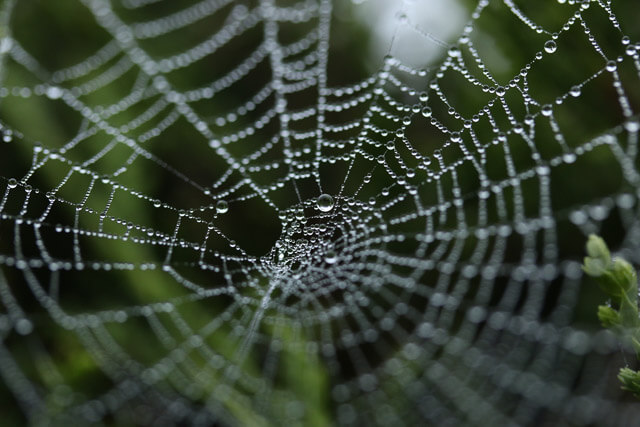
E.O. Wilson coined the word biophilia, which means “love of life,” to describe the way we’re wired to have deep connections with other living things.
A family garden connects you with each other and to the natural world. You start to notice plants, insects, worms, and toads, in your own garden or wherever you go. (This noticing is especially strong, if you walk around with a two year old!)
“From the freedom to explore comes the joy of learning. From knowledge acquired by personal initiative arises the desire for more knowledge. And from mastery of the novel and beautiful world awaiting every child comes self-confidence.” – Edward O. Wilson
3. Confidence
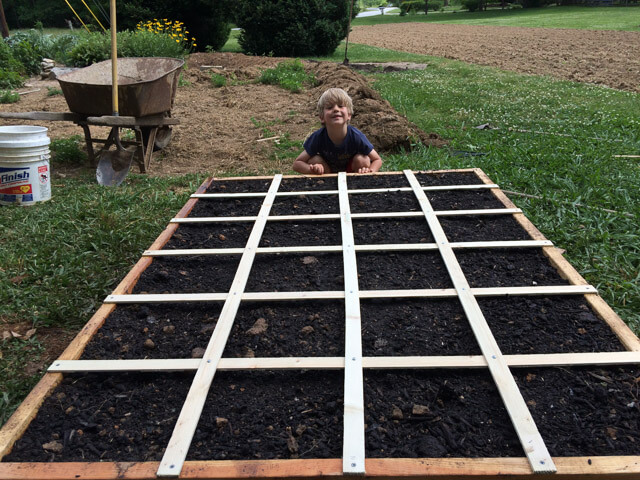
As your garden grows, your family’s confidence grow too. Kids go from helpers to leaders as they master new tasks. “I’ll do it all by myself!” is a refrain here, even when we’d rather not turn over a task completely.
But often, we’re willing to step back, accept a little messiness, and see the proud, confident looks on their faces when they’re done.
4. Cooperation
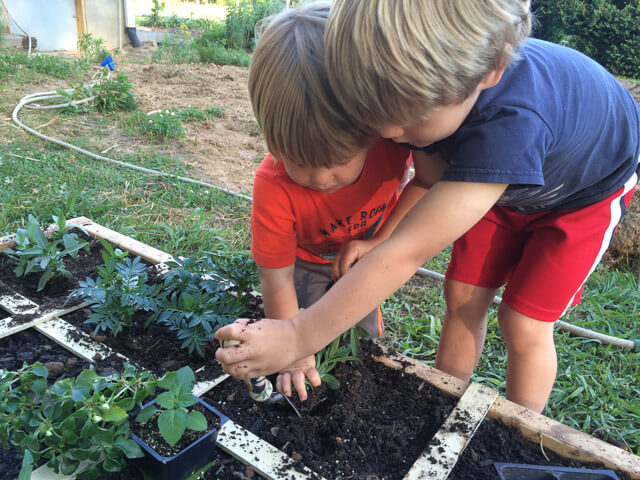
Projects and free play in the garden let kids practice teamwork, sharing, and taking turns. (It’s good practice for adults, too!)
5. Coordination
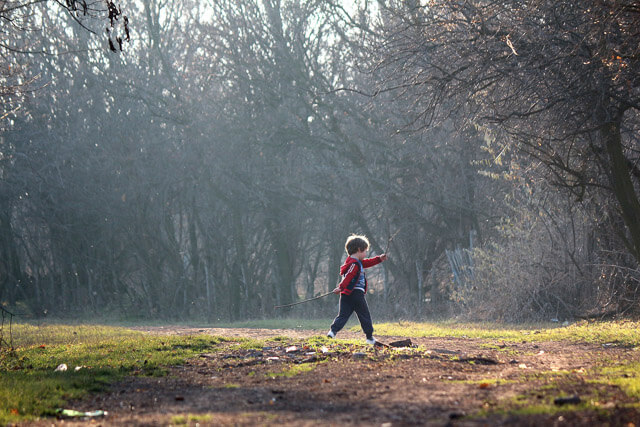
Outdoor play in natural areas builds our coordination and strength. In her book Balanced and Barefoot, occupational therapist Angela Hanscom describes studies in Norway and Sweden that compared preschoolers who played on a flat playground with kids who played among rocks, trees and uneven terrain.
Can you guess which kids had better balance and agility?
Naturally, the answer is the natural terrain!
6. Creativity
Our brains work better when we spend time in nature, too. We can concentrate better and be more creative when we spend time in our gardens. It works at home and at school, too.
Researchers have seen that students playing in the green spaces of their school yard are more creative (and more cooperative!) than those playing in the asphant-covered areas. (Bell and Dyment, 2006).
“Boredom is fear’s dull cousin. It can numb the brain or it can stimulate creativity, especially in nature.” – Richard Louv, author of Last Child in the Woods and founder of the Children and Nature Network
7. Curative (aka Healthy!)
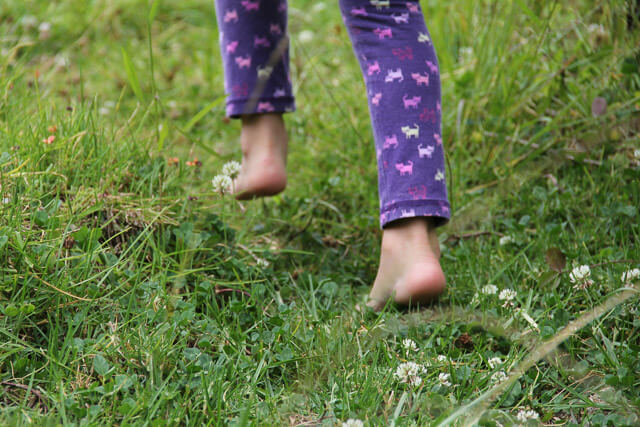
Along with the healthy food in #1, your garden can be good for your health. Your family gets exercise and sunshine for making Vitamin D. Time in nature can help with problems like anxiety, depression, ADD, and obesity.
Plus, playing in dirt can actually boost kids’ immune systems. Studies have shown that kids who grew up on farms or with a dog in the house had fewer allergies.
8. Curiosity
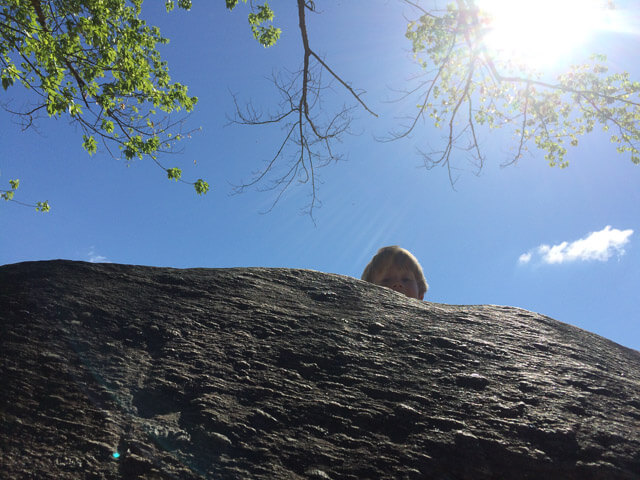
A garden is full of interesting tidbits. Plants, animals, rocks, sticks and mud–there is much to explore.
I love to hang back and watch our small scientists. Testing everything, and I do mean everything. All of their senses are engaged, and they are learning about the world by playing in it.
9. Classroom
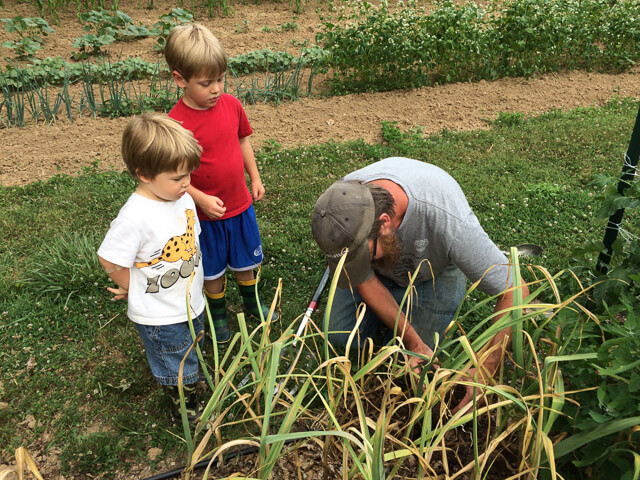
The garden is rich in experiential lessons, but sometimes, we take a more active role in teaching. In recent weeks, we’ve identified plants, talked about predators and prey, looked at worms and Japanese beetles, and explored how quartz crystals form.
The lessons aren’t limited to the natural sciences. Learning spills over into other areas, too. Math, reading, writing, history and more can be shared during garden-based learning.
10. Care for Others
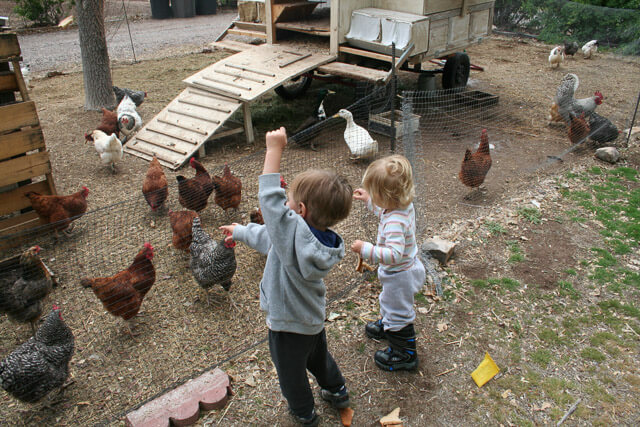
We believe two of the most important things we can teach our children are caring and empathy. Our garden is the perfect place to learn about caring for others in very real ways.
They tend tomatoes and feed the animals.
We talk about how parents care for children with examples from mama hens, daddy bluebirds, and their chicks.
And we talk about how it must feel to be a toad that’s been picked up and carried by a “giant.”
We try to model empathy and help them understand the world from another’s perspective.
11. Care for the Earth
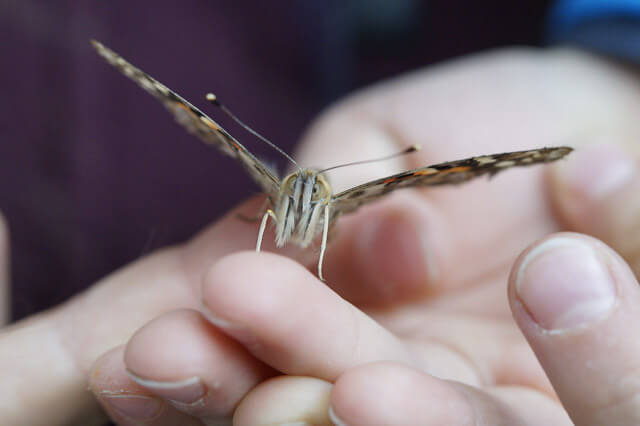
In the garden, we come to understand and love the natural world. We are stewards, and our children learn to be stewards, too.
Today’s environmental problems can feel overwhelming and our next generation will face even tougher challenges.
The good news is this: we can all grow solutions in our own backyards. When you garden, you practice conservation with each round of seeds, pile of compost and basket of ultra-local produce.
A family garden grounds your kids in a fundamental understanding of how plants, animals and ecosystems work. They grow up well-informed and ready to take part in decision-making about environmental issues.
Now, you have proof that letting kids play in the mud makes you an awesome parent/grandparent/neighbor!
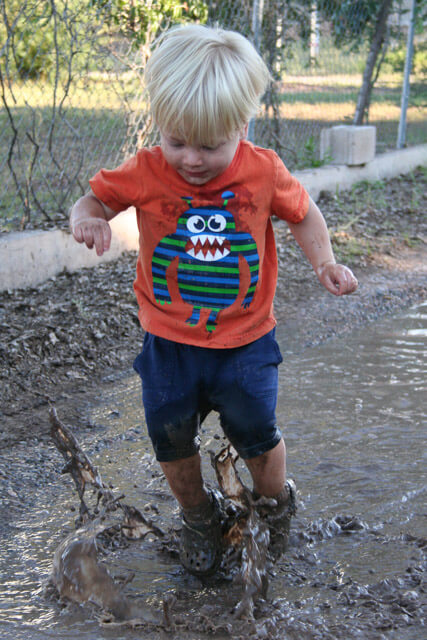
What reasons matter most to you? Are there benefits that you’d add to the list of reasons to garden with kids?
Tell us in the comments below!

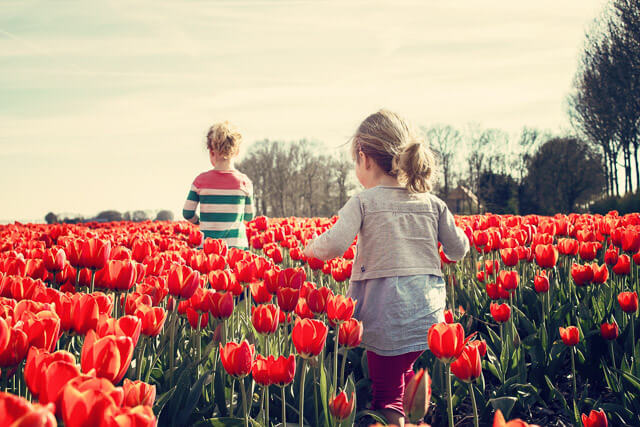
I love this article you guys! My biggest two problems: getting kids to stay and play outside and helping them show empathy to the animals and plants. They tear up fruit trees, chase the chickens and pull at their tailfeathers. You name it. Any thoughts?
(I think on the first one, I should get out and play more often, which models it for them. But I also do not remember my mom being outside playing with us as youth – we went it alone!)
Thx! Andrea
Thanks, Andrea! I think you’re right that getting out to play yourself is a good start. When I’m out playing with my kiddos, I try to remember what Janet Lansbury (http://www.janetlansbury.com/) says about being a play supporter, instead of a play leader: “When we sit quietly and are passive, yet receptive and attentive to our children while they play, they feel just as nurtured by our companionship (if not more so) than they do when we are actively involved.”
I want to encourage them, but not solve all their problems. And I remind myself that it’s okay to get bored/frustrated…those are the moments that the creativity comes out! As they learn to play independently, sort out conflicts (without resorting to blows!), and navigate risks, I can imagine a day when I send them out to play until it gets dark. 🙂
As far as empathy goes, our kids can go from gently petting to maniacally chasing a chicken in a moment. I practice a mix of explaining (here’s why we don’t do ___), modeling (showing my own empathy toward plants and animals, including toddlers!) and clear boundaries. And yes, I usually have to repeat/enforce the boundaries several times, but when I can be clear and confident about the boundary, they tend to follow it. Hope that helps!